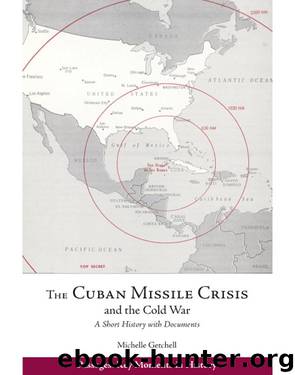The Cuban Missile Crisis and the Cold War by Getchell Michelle;

Author:Getchell, Michelle;
Language: eng
Format: epub
Publisher: Hackett Publishing Company, Incorporated
Published: 2018-08-08T16:00:00+00:00
The Future of Cuban-Soviet Relations
The Cuban Missile Crisis was a watershed in the Cuban-Soviet relationship. It undermined Cuban trust in the Soviet leadership and led to a breach in the alliance that would not be repaired until the early 1970s. On October 29, after Castro discovered that Khrushchev had reached an agreement without even bothering to consult him, Soviet ambassador in Havana Aleksandr Alekseev cabled Moscow with the news that he had “never seen him [Castro] so distraught and irate.”334 The Cuban people were reportedly engaging in spontaneous anti-Soviet demonstrations throughout the country, ripping down pro-Soviet posters and {110} billboards, and, at Castro’s urging, chanting slurs that called into question Khrushchev’s manhood.335
The missile crisis was the first serious rupture in the Cuban-Soviet alliance. Castro felt that Khrushchev had sold out the Cuban Revolution in order to gain Washington’s favor. Indeed, in negotiations with Kennedy, Khrushchev falsified information so as to place the blame squarely on the Cubans; he claimed that the missiles were sent “per request of the Cuban government.”336 The crisis was a major breach in the Soviet-Cuban relationship; the level of trust and understanding that existed before the crisis would never again be reached. The Cubans had viewed the Soviet proposal to station missiles on Cuban territory as a form of protection tantamount to that given to the socialist bloc; in other words, the Cubans thought they were safely situated under the Soviet nuclear umbrella. Moreover, the Cubans believed that in safeguarding the revolution, the Soviets had tacitly agreed to Cuban support of armed revolutionary movements in the Western Hemisphere. In a single stroke, the Soviet capitulation to U.S. demands disabused the Cuban leadership of these notions. What made the reality particularly disillusioning is that the Cubans had been prepared to lay down their lives as martyrs to the revolutionary cause in the event of a nuclear war.337 Though the alliance soldiered on until the end of the Cold War and the collapse of the USSR, the Cubans would never again trust the Soviets completely. Lev Mendelevich, the former chief of the Latin American Directorate of the Soviet Foreign Ministry, has been quoted as saying that “after what happened in 1962, the Cubans will never be our real friends.”338
Nevertheless, Khrushchev was determined to repair relations with Castro, and in January 1963, sent him a long, rambling letter that included an invitation to Moscow and a thinly veiled warning against the provocations of the Chinese. The Chinese were quick to criticize Khrushchev, not only for the “venturesome blunder” of installing missiles in Cuba, but also because by removing the missiles, he had “capitulated to American imperialism.”339 With the Sino-Soviet split deepening, Havana looked to {111} Peking for ideological camaraderie and support to balance its dependence on Moscow.340 Khrushchev sought to forestall any further strengthening of Sino-Cuban friendship, and believed that by spending time with Castro, he could convince the Cuban leader to realign with the Soviet party line. He pointed out, moreover, without naming China specifically, that “the leaders of certain socialist countries .
Download
This site does not store any files on its server. We only index and link to content provided by other sites. Please contact the content providers to delete copyright contents if any and email us, we'll remove relevant links or contents immediately.
| Africa | Americas |
| Arctic & Antarctica | Asia |
| Australia & Oceania | Europe |
| Middle East | Russia |
| United States | World |
| Ancient Civilizations | Military |
| Historical Study & Educational Resources |
In Cold Blood by Truman Capote(3374)
The Innovators: How a Group of Hackers, Geniuses, and Geeks Created the Digital Revolution by Walter Isaacson(3144)
Steve Jobs by Walter Isaacson(2889)
All the President's Men by Carl Bernstein & Bob Woodward(2362)
Lonely Planet New York City by Lonely Planet(2216)
And the Band Played On by Randy Shilts(2197)
The Room Where It Happened by John Bolton;(2150)
The Poisoner's Handbook by Deborah Blum(2132)
The Innovators by Walter Isaacson(2096)
The Murder of Marilyn Monroe by Jay Margolis(2094)
Lincoln by David Herbert Donald(1981)
A Colony in a Nation by Chris Hayes(1926)
Being George Washington by Beck Glenn(1908)
Under the Banner of Heaven: A Story of Violent Faith by Jon Krakauer(1788)
Amelia Earhart by Doris L. Rich(1687)
The Unsettlers by Mark Sundeen(1682)
Dirt by Bill Buford(1669)
Birdmen by Lawrence Goldstone(1662)
Zeitoun by Dave Eggers(1643)
